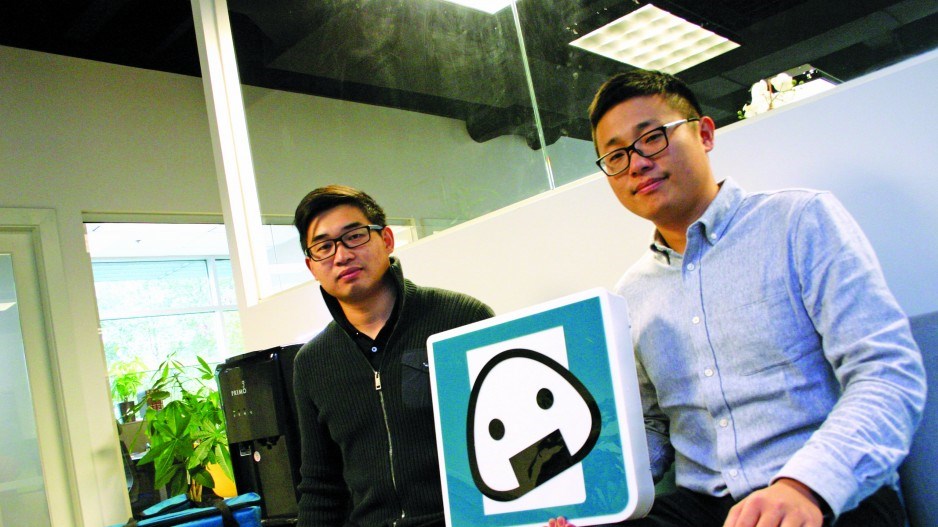Most university students who are two terms away from graduation are usually focused on their final few months of school and finding a job, not starting a company from scratch. But Randy Wu isn’t like most students.
In 2014, just months before he was slated to graduate from Simon Fraser University, Wu decided to leave the school to start Just Order Enterprise Corp. and its mobile food-order service app, Fantuan (“rice ball” in Mandarin Chinese).
Wu said many of his friends tried to talk him into returning to school; he also had doubts about entering the entrepreneurial world.
“Truth be told, I didn’t even tell my parents back in China when we started,” Wu remembered with a smile. “The whole reason they sent me here was to study and get a degree, so I didn’t know how they’d react. But my girlfriend convinced me that, if this is something I really wanted to do, then getting in early is an opportunity that can’t be missed.”
Today, Fantuan’s triangular logo featuring a smiling cartoon rice ball is ubiquitous at Metro Vancouver restaurants featuring Asian cuisines, especially in neighbourhoods in Vancouver, Richmond and Burnaby close to major post-secondary schools. Although no official revenue figures are available, the company now employs a staff of 32 in Vancouver (24 full time) and a contractor-based delivery force of 400.
About 300-plus restaurants now use the Fantuan app, which runs on Chinese social media platform WeChat, facilitating orders from newcomers to Metro Vancouver from China, many of whom are students.
“A lot of my friends, especially older friends, were skeptical that Fantuan would work, because they didn’t understand why someone would pay extra to have something delivered,” Wu said. “But I told them that they are not the target audience. Many new students don’t have cars; even if they do, they are not familiar with Greater Vancouver, and they will naturally gravitate toward finding food using a familiar avenue – and that’s online.”
In China, online food ordering through WeChat is already the norm. Customers can order meals, pay, share and write reviews on a smartphone without leaving their homes. Wu and co-founder Feng Yaofei said Fantuan has become successful by offering, in Vancouver, a service similar to what a consumer would find in China.
But the growth hasn’t always been easy. Wu said initial uptake from local restaurants was slow in 2014, though he understands why businesses were wary of signing on with the then-new venture.
“When you are starting out, how do you guarantee a gain for the restaurants? Why would they choose something with no track record?” Wu said. “A lot a restaurants said no. But then we would go back four, five times, and eventually many relented. But we got a lot of comments like this: ‘We are doing this because this is a good entrepreneurial experience for a young person like you, but we don’t think it’s going to work. After you try this, you should go back to school.’”
Today, Fantuan can be found not only in Vancouver, but also in Toronto, where it has been operating for about a year. The app’s success and growth, Wu said, was mainly due to the company dedicating a quarter of its staff to two issues: making sure the deliveries arrive on time and guaranteeing that delivery contractors make money on their runs.
To that end, Fantuan has people in its office processing orders and plotting routes for each delivery person so that one driver can take up to three orders at a time, increasing drivers’ margins and keeping them happy.
“A happy driver is crucial to the experience we are targeting to provide,” Wu said. “If they are happy, they will provide better service. They will stay on the job more, and that experience in the market is hard to replace. It’s central to our growth plan, but it is labour-intensive, so our company’s profit margins are lower than some of our English-speaking competitors, who often automate everything through an app.”
That’s why the company is looking for venture capital investors to work with, Wu said, adding that the company has two plans for 2018: incorporating other service providers like movers and cleaners into Fantuan’s available orders, and exploring entering the U.S. market in cities like Los Angeles and San Francisco.
He said the firm will also look to “strategically dabble” in the mainstream delivery market in Vancouver, but the focus will remain the Chinese-speaking market in the meantime. •




